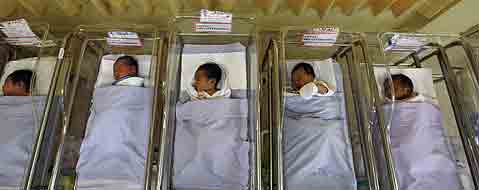|
Babies lie in cots at a maternity ward in Singapore. The government introduced tax rebates, baby bonuses and longer maternity leave in recent years to encourage women to have more children. (Source: Reuters) This huge increase is mainly because people throughout the world are living longer due to better nutrition and health care – an average of 69 years worldwide compared to 48 in 1949. Obviously there is a big disparity between life expectancy in the developing countries and life expectancy in the West, where the average life expectancy is around 80. For your information, the world's five most populous countries are China (1.3 billion), India (1.2 billion), the United States (310.2 million), Indonesia (242.9 million) and Brazil (201.1 million). On its website marking World Population Day the United Nations Population Fund (UNFPA) says this: - “In many ways a world of 7 billion is an achievement: Globally, people are living longer and healthier lives, and couples are choosing to have fewer children”. While the growing population means our resources need to be managed more carefully, the increase in longevity is still a great achievement for mankind and very positive news. Top of World Population Explosion |
Translate this Site
Search This Site
Loading
Subscribe to E-Zine
Support this Site
|
Holiday SpecialsFor Holiday Specials at Amazon, Click Here
|
| |||||






